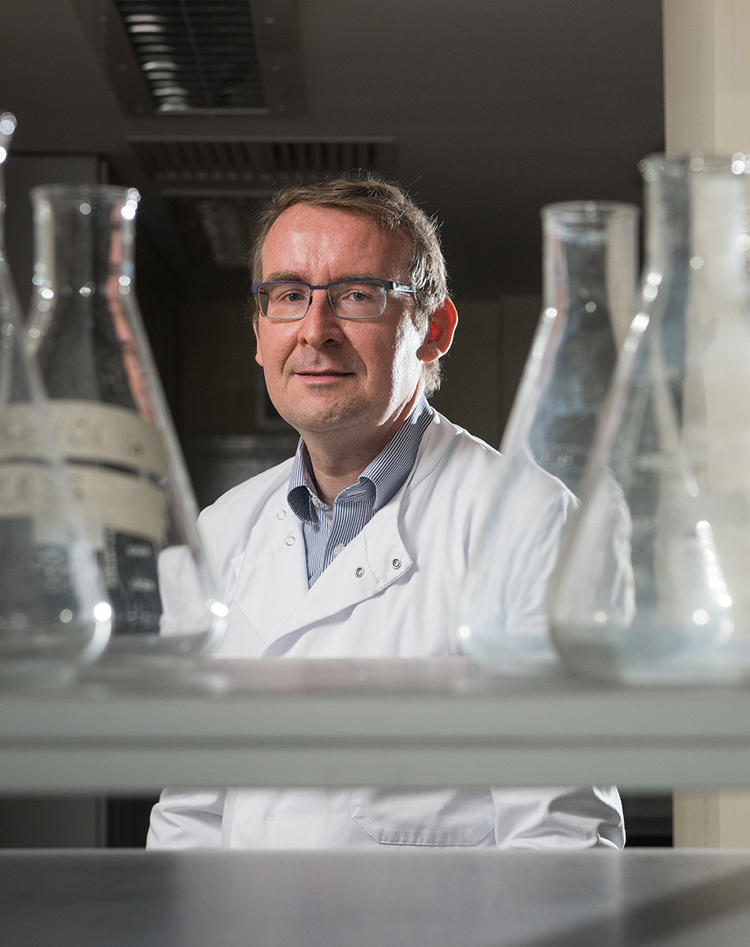CCBIO Seminar – Ian Mills
Speaker: Ian Mills, Centre for Cancer Research and Cell Biology, Queen's University Belfast, Northern Ireland, and Nuffield Department of Surgical Sciences, University of Oxford, UK. Title: "Non-oncogene addiction and the stress phenotype of prostate cancer cells." The seminar will be held through a digital platform (Zoom Webinar), so you can attend even from the comfort of your own home.
Hovedinnhold
Speaker: Ian Mills, Centre for Cancer Research and Cell Biology, Queen's University Belfast, Northern Ireland, and Nuffield Department of Surgical Sciences, University of Oxford, UK
Title: "Non-oncogene addiction and the stress phenotype of prostate cancer cells"
Place: digital event as webinar in Zoom. Link to webinar as audience: https://uib.zoom.us/j/63542006834?pwd=MUNGcEpHUE9iQXVTSmlDWU5LZzcxQT09 If asked for a passcode, use: p8KAfg0a
Time: April 29, 2021 at 14:30 (timezone in Norway, that is 13:30 UK time, 08:30 Boston time)
Chair: Karl-Henning Kalland
Abstract: Prostate cancer is a high incidence male cancer and a significant cause of cancer-specific mortality. In the course of the last two decades genomics has identified a complex landscape of mutational changes associated with prostate cancers within individual patients and across patient cohorts. This multi-focal heterogeneity has made it difficult to identify oncogenic driver mutations in early-stage disease, although there is evidence for clonal selection as prostate cancer progresses to metastasis. By contrast there is significant evidence of high-incidence transcriptional, epigenetic and metabolic changes in early-stage prostate cancer. The phrase ‘non-oncogene addiction’ refers to a dependency on biological processes supported by genes and proteins that are not individually able to fully transform cells but are able to create a cancer permissive state. Given that mutational selection occurs in the progression to advanced/metastatic prostate cancer, we hypothesize that non-oncogene addiction may be particularly significant in the earlier stages of prostate cancer development and in localized disease. In this seminar I will provide some examples of these processes and refer in particular to transcriptional processivity, the unfolded protein response and nucleolar function. I will discuss the challenges and opportunities in assessing their activity and in perturbing them to impact on prostate cancer progression.
Short bio: Professor Ian Mills earned his PhD in Molecular and Cellular Physiology at the University of Liverpool in 2000. He is currently Professor of Translational Prostate Cancer Biology at Queen’s University of Belfast and John Black Associate Professor of Prostate Cancer at the University of Oxford. In addition he is a Visiting Scientist at Cambridge Cancer Research UK Institute, an Honorary Visiting Fellow in the Department of Oncology at the University of Cambridge and an Affiliate Member of the Centre for Molecular Medicine Norway (NCMM). Since 2018 he is Affiliated Professor at Centre for Cancer Biomarkers (CCBIO), University of Bergen.
His work on prostate cancer is focusing on the impact of transcriptional and chromatin dysregulation on metabolism and stress response pathways, aiming to understand the interplay between these biologies and radiotherapy response, as well as on the development of new pre-clinical models of prostate cancer. He is working to understand how these biological processes synergize with treatment stress to influence the evolution of prostate cancers, investigating this alongside complementary research teams led by computational biologists, surgical clinician scientists, pathologists and bone biologists.
Open to all!
Zoom practicalities:
Note: Please change any username to your name when logging in, so that chair can address you by name if you have questions.
- Your sound and video will be turned off as default for security reasons, and only host can de-mute individual participants.
- We will open for questions after the lecture, where you can use the Raise hand function, or type your question in Chat. Host will then de-mute your sound and address you by your name (please log on with your name).
- If you think you might want to ask questions, please test your microphone beforehand. Make sure your microphone is turned on. (Or ask host to read out your typed question).
- We advise all to have a Zoom account on your device beforehand (free service), that will save you some minutes when logging on.
Those of us with University of Bergen (UiB) client machines, might already have Zoom. If not, see https://it.uib.no/Jeg_skal_bruke_Zoom_for_f%C3%B8rste_gang
For private machines (not UiB), see https://zoom.us/download#client_4meeting Otherwise, clicking the logon link provided above will prompt the Zoom app to download, but it saves you time to have done this beforehand.
